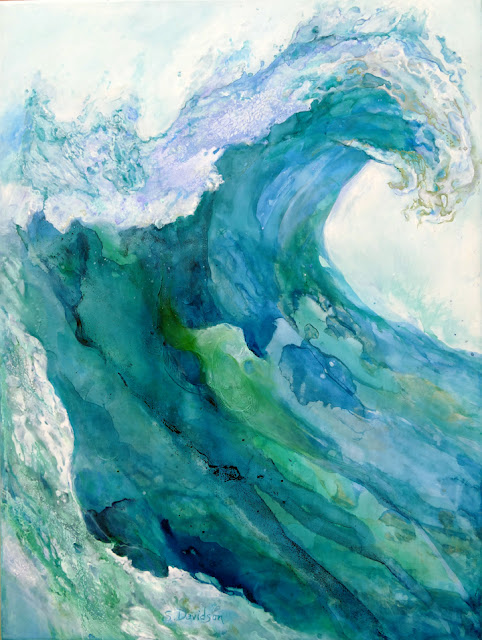In a recent post, I mentioned that I wasn't happy with the
first of three pieces that I did for a client. I had hoped to send her photos of at least three, so that she could choose one to go with two others she had already purchased. So I added some plants on both sides, interrupting and covering most of that big horseshoe-shaped area on the bottom, which I felt was competing too much with the focal point.

Is it better, worse, or just
the same?
Sometimes I debate with myself over whether I've actually improved the piece when I make changes like this. Often I wonder if what I'm putting in is as good as what I'm taking out. Was it better before? Was it worth the risk of losing what I covered up? At these times I hear the eye doctor's voice echoing in my head, "Is it better, worse, or just the same?" Looking at an eye chart, though, the choice is usually far more obvious.
In life, as in art, the choices are not often so clear. So, what do you do? If we doubt all our choices too much, indecision can easily turn into paralysis. The outcomes of this type of thinking are that you do nothing, which is a waste of your talent and precious time, or that you let circumstances and/or others make your decisions for you. And believe me, you might not like the ones they make.
Of course, major life decisions are much more difficult to make than choosing what to glue onto a collage. If you don't like what you've done to a piece of art, you can glue something else on, tear something off, paint over it, or cut it up and reuse the pieces. If you make a bad choice in life, you have to live with it, literally. For many of us, this thought is pretty scary. Lately, I have found decision-making of any kind daunting. For example, I'm seemingly unable to figure out what direction I want to take with my work. This is not a life-or-death decision, so why is it giving me so much trouble?
photos by Colin Reusch
In his article,
You Cannot Choose the Wrong Path, Stephen Mills writes, "You can’t possibly know what experiences you would have had if you had chosen differently. Life is too contingent for that kind of after-the-fact-it-might-have-been obsessing." He sheds more light on this subject in another post,
Why You Should be More Decisive:
"When you spend too much time analyzing a decision, you are usually less satisfied with whatever decision you end up making. People who consider more factors when making decisions are more likely to worry later that they didn’t make the right decisions. So they agonize during the decision making process and then worry even after they’ve made a decision." Yup, that's me.
I like the way
Larry Crane puts it: "Often, it is not the end action that creates the most fear; it is the decision to act or not act. Since life offers no guarantees and you would never know that your decision would be wrong until you have made it, then you might as well let go of all of your fear, take the risk, and decide. It is definitely better than keeping yourself in limbo. Although it is true that one wrong turn could get you seemingly lost, it could also be that such a turn could be an opportunity for an adventure, and even open more fantastic roads.
It is all a matter of perspective. You have the choice between being a lost traveler or an accidental tourist of life. You have the choice to let go of your fear of deciding."
IT IS ALL A MATTER OF PERSPECTIVE. Can someone remind me of that every three seconds or so?
OK, these are the three pieces I'm sending to my customer:
Transformation 41
Transformation 42
Transformation 43
That's my final answer. I'm not phoning a friend.
















